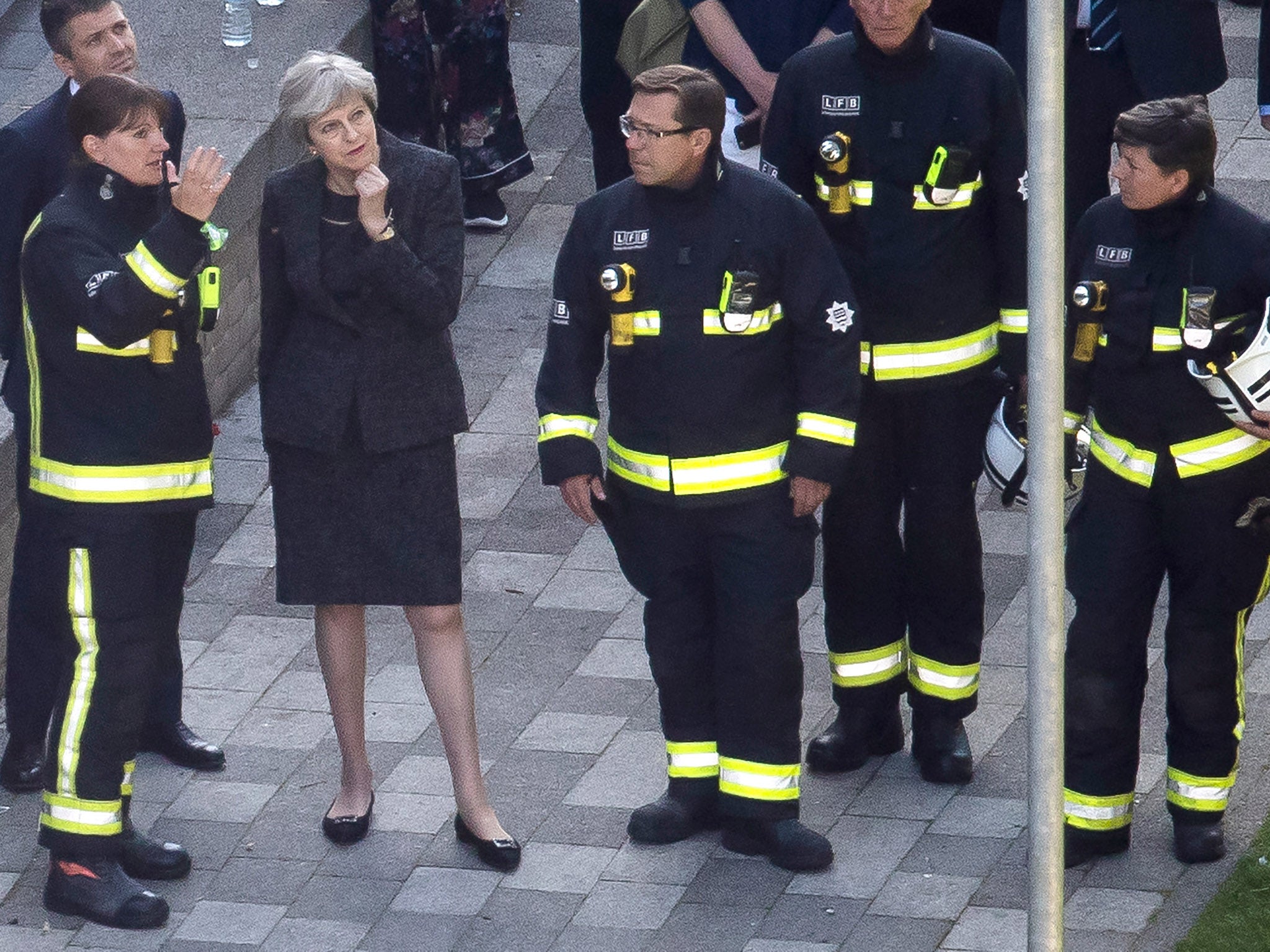Theresa May's approval ratings are now as low as pre-campaign Corbyn's – here's how it all went wrong
In a photograph that will likely become an enduring symbol of the cold, heartless image that the many have of her, May stands alone surrounded by police, as Jeremy Corbyn comforted the residents of Grenfell Tower


It has been a little over eight weeks since Theresa May announced the snap general election. At the time there was talk of a landslide Tory majority of over 100 seats.
But as we all know, it was not to be. If a week is a long time in politics, then eight weeks is an eternity.
On top of the humiliation of failing to secure a majority, May’s personal approval rating has plummeted drastically. When she stood on the steps of Downing Street and “spoke directly” to the “just about managing”, May enjoyed a favourability rating higher than Tony Blair when he first took office. According to YouGov, May’s approval rating now languishes at minus 34 per cent, almost as low as Jeremy Corbyn’s abysmal pre-campaign rating. This means that public confidence in her has fallen by over 40 per cent since she called the election.
So what went wrong?
When speaking to voters, her robotic manner combined with the overly controlled, secretive nature of her campaign came up frequently. “Going into the campaign I thought May was quite a competent leader, and certainly the best of a bad bunch in terms of someone who could manage the complexities of Brexit”, says writer Jack Lahart. “But she made some really questionable choices and appeared far too stage-managed.”
Almost all of the voters who I spoke to were turned off by May’s failure to attend the party leaders debate or debate Corbyn one-on-one. “I was certain I would vote for May, but the way she hid from the public and took us for fools meant I decided against it”, says Jordon Lee.
Another recurring theme is the perceived arrogance of the Conservative Party. Calling an unnecessary election on the eve of Brexit negotiations was seen by many as putting party interest before the rest of the country. While flying high in the polls, the Tories published a deeply unpopular, uncosted manifesto. Backlash to their proposed changes to social care led to the infamous U-turn on the dementia tax. And this is where everything started to unravel.
Up until this point, the Tory campaign had revolved around three things: Brexit, “Strong and Stable” and May herself. Such was the focus on May’s popularity, that it was virtually impossible to find the word “Conservatives” on any of the party’s branding. She made it presidential.
But the manifesto U-turn changed two things. Firstly, it forced many voters to look at the Tory’s uncaring manifesto for the first time and question the narrative of May as a strong and stable leader. Secondly, it shattered any notion that May is in some way different or more compassionate than the Tory leaders who preceeded her.
This misstep allowed Corbyn to permanently shift the focus of the election towards public services and austerity. Even late attempts to capitalise on security fears following the recent terror attacks ended with May’s record as Home Secretary being dragged through the mud.
Like a candidate on The Apprentice tasked with creating a new brand of toothpaste, May spent the rest of the campaign desperately throwing out soundbites hoping that something would stick. Evidently, not many of them did.
After failing to win a majority, May’s popularity has continued to plummet. This has been driven by the fact that 48 per cent of voters surveyed by YouGov oppose any kind of deal with the DUP.
May has also faced criticism for her half-hearted cabinet reshuffle. “I liked Theresa May, but now I want her to resign.” Says Thorrun Govind, a community pharmacist who has previously voted Conservative. “I can’t believe she's kept Hunt as health secretary – the cuts to pharmacies that he has overseen show a basic misunderstanding of the health service.”
But surely it couldn’t get any worse?
This week May caused more outrage after choosing not to meet victims of the Grenfell Tower fire when she visited the site. Defence Secretary Tobias Ellwood cited “safety concerns”, yet Jeremy Corbyn was seen embracing victims and today the Queen has visited. In a photograph that will likely become an enduring symbol of the cold, heartless image that the many have of her, May stands alone surrounded by police.
When discussing the rise and fall of May, it’s important to acknowledge that perhaps she never deserved the high approval ratings she once had. Her demise was probably inevitable. Yet she is now seen as a politician who abandons her principles for short-term gain. This label will be hard to shake, as there are few narratives that the public find more believable than that of a crooked politician.
Facing a group of Conservative backbenchers earlier this week, she said: “I got us into this mess, I’m going to get us out of it”. Yet it seems inconceivable that she’ll lead her party into another election. In the Tory Party, once you’re seen as a loser, your days are numbered. Like a white tablecloth covered in red wine, May’s premiership has been permenantly stained by defeat.


Join our commenting forum
Join thought-provoking conversations, follow other Independent readers and see their replies